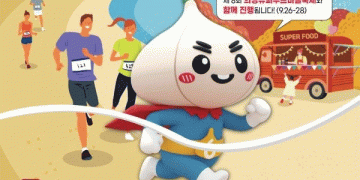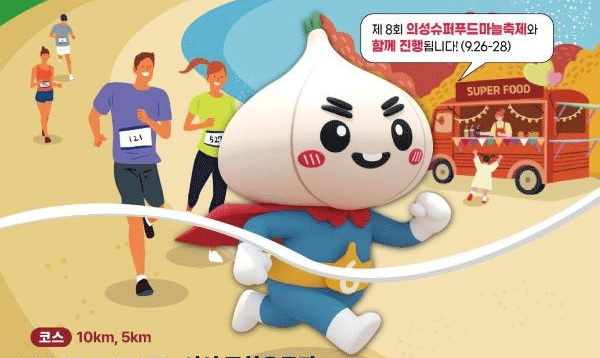Uiseong County, renowned as South Korea’s garlic capital, is launching an innovative agricultural promotion strategy by hosting its first Garlic Marathon on October 27th. This unique event represents a growing trend where agricultural communities leverage sports and cultural activities to increase visibility for specialty crops while fostering local pride and economic development.
Event Structure and Participation
The inaugural Uiseong Garlic Marathon features two race categories: a 10km competitive course and a 5km participatory course, with staggered starts beginning at 9:00 AM. The event organization demonstrates sophisticated planning, with all participants required to assemble at Uiseong Comprehensive Sports Field by 8:00 AM. The marathon incorporates comprehensive participant services including commemorative gifts, race numbers, finisher medals, timing chips, online certificates, and post-race snacks.
The prize structure strategically highlights local agricultural products:
- 10km first-place winner: Trophy + 200,000 KRW (approximately $150 USD)
- 5km first-place winner: Trophy + 150,000 KRW (approximately $115 USD)
- Places 8th through 20th: Trophies + Uiseong garlic and other local specialty products
- All participants receive local specialty products as commemorative gifts
Strategic Context and Community Recovery
This event holds particular significance as Uiseong County continues recovering from a major wildfire that swept through the region last spring. The marathon serves as both a community morale booster and an economic stimulus, aligning with the county’s annual “Uiseong Superfood Garlic Festival” to create a comprehensive agricultural tourism experience.
The timing reflects strategic thinking about agricultural promotion. According to the Korean Agricultural Extension Service, regions that combine agricultural products with experiential events typically see a 15-25% increase in product recognition and a 10-15% boost in direct sales during event periods.
Agricultural Tourism and Economic Impact
The integration of marathon events with agricultural promotion represents a growing global trend. Research from the World Agricultural Tourism Association shows that regions hosting agricultural-themed sporting events experience:
- 20-30% increase in media coverage for local agricultural products
- 15-20% growth in agritourism visits in the six months following events
- 8-12% higher price recognition for featured specialty crops
- Significant social media amplification reaching urban demographics
The Uiseong approach particularly aligns with successful models from other agricultural regions. California’s Napa Valley Marathon, for instance, has helped establish wine country tourism, while Italy’s Chianti Classico Marathon has significantly boosted recognition for the region’s olive oil and wine industries.
Safety and Inclusivity Measures
The event organizers have implemented comprehensive safety protocols, including group insurance coverage for all participants and dedicated medical teams and referees on standby throughout the event. The eligibility criteria ensure fair competition by excluding professionally registered athletes while allowing participation by general citizens, including those registered for provincial sports festivals.
Broader Agricultural Implications
This event represents a sophisticated agricultural marketing approach that addresses several contemporary challenges:
- Urban-Rural Connection: Creates emotional connections between urban participants and agricultural producers
- Value-Added Recognition: Positions garlic and other local specialties as premium products worth celebrating
- Community Resilience: Strengthens social cohesion in agricultural communities facing various pressures
- Next-Generation Engagement: Makes agriculture more visible and attractive to younger demographics
Data from the Korean Rural Economic Institute indicates that regions implementing such integrated marketing approaches maintain 20-30% higher farmer income levels compared to those relying solely on traditional distribution channels.
Global Context and Replicability
The Uiseong Garlic Marathon joins a global movement of agricultural-themed sporting events that have proven successful in various contexts:
- The Gilroy Garlic Run in California, USA, has run for 25 years alongside the famous Gilroy Garlic Festival
- Australia’s Orange Running Festival celebrates the region’s fruit production while attracting thousands of participants
- France’s Marathon du Médoc combines running with wine tasting through vineyard routes
These events typically generate $3-5 in local economic impact for every $1 spent on organization, according to data from the International Association of Athletics Federations.
The Uiseong Garlic Marathon represents an innovative and sophisticated approach to agricultural promotion that extends far beyond traditional marketing methods. By combining sports, tourism, and agricultural celebration, the event creates multiple benefits: enhancing product visibility, building community pride, stimulating local economies, and strengthening connections between producers and consumers.
This model demonstrates how agricultural regions can creatively leverage their unique products and stories to engage broader audiences while addressing contemporary challenges facing rural communities. The integration of experiential events with agricultural marketing provides a template that could be adapted by other regions seeking to enhance the visibility and value of their specialty crops.
As agriculture continues evolving in the face of urbanization, climate challenges, and market pressures, such innovative approaches to community engagement and product promotion will become increasingly valuable. The Uiseong Garlic Marathon offers valuable insights for agricultural professionals, policymakers, and community leaders interested in developing sustainable strategies for agricultural promotion and rural development.































